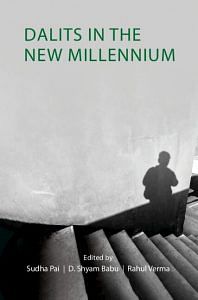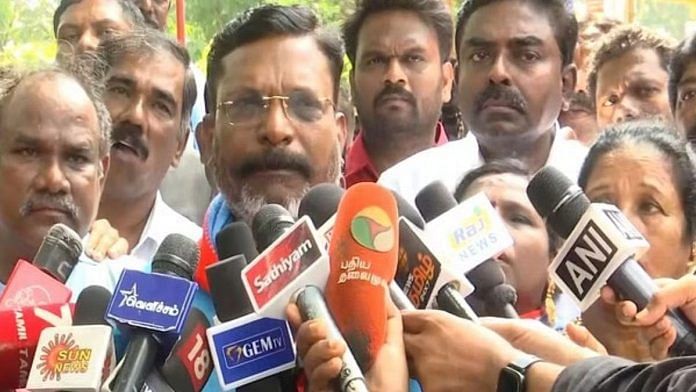For the VCK – the largest Dalit party in Tamil Nadu and among the most prominent in India – the implications of ‘money power’ in elections are particularly acute. Of the party’s original leadership, most are first-generation politicians from landless families (or those with meagre landholdings) who were the first in their households to access higher education. Many of them resigned from public-sector jobs, thereby forfeiting the security of government employment, to enter democratic politics in 1999.
This contrasts sharply with the backgrounds of elite new politicians in Tamil Nadu (and across India) who tapped family connections or capitalized on successful business ventures to enter elected office. Although the economic resources available to VCK leaders have certainly grown through two decades of participation, they remain at a stark comparative disadvantage in terms of their access to the wealth and corporate connections necessary to finance competitive election campaigns. This dearth of what party insiders glossed over in our discussions as ‘candidate capacity’ prompts them to forge alliances with established parties to access the infrastructure, capital networks, and technical expertise required for electoral competition.
Tamil Nadu has a competitive, bipolar political system where no party can win with Dalit votes alone. Lacking party members with access to sufficient wealth and corporate patrons, the VCK has foremost relied on political coalitions with the state’s dominant Dravidian parties – the Dravida Munnetra Kazhagam (DMK) and the All India Anna Dravida Munnetra Kazhagam (AIADMK) – to organize and finance election campaigns. In exchange for electoral support from allied partners (such as the VCK), the Dravidian financier shoulders the lion’s share of campaign expenditure and undertakes costs related to political propaganda, print and digital advertising, vehicle and equipment hire, political rallies, food, transportation, daily bhatta (informal wages) for cadres, and miscellaneous day- to-day expenses incurred on campaign activity.
Moreover, the Dravidian patron administers allied campaigns, marshalling its party infrastructure and canvassing expertise in support of allied candidates. While Dravidian benefactors may earmark crores of rupees to finance their campaigns, their allies are still expected to remunerate their own cadre and cover party-specific expenses. In effect, the Dravidian sponsor underwrites and administers the campaigns of allied parties, providing time-tested experience in electioneering, extensive party networks and infrastructure, and legions of cadres for vote canvassing. Wherever possible, lucrative election contracts are awarded to businesses owned by or affiliated with party members, their families, and close supporters.
In conversations over the years, former VCK candidates shared their experience with election finance, recognizing the importance of external support while also being aware of the compromises folded into these arrangements. For example, a former VCK candidate recounted his failed assembly bid: ‘In 2001, the DMK supplied INR 1 crore to support each of our assembly campaigns. In 2006, the AIADMK supported us during assembly elections and then, in 2011, we contested alongside the DMK. In 2011, the DMK allocated INR 2 crores for my campaign, but the DMK office bearers alone managed my election expenses. Every day they would disburse some INR 5,000 directly to me for my canvassing activities or to cover fuel, posters, and other expenses, but they themselves administered the election fund. On a daily basis, they would circulate some INR 10 lakhs among their cadres for vehicles, fuel, food, propaganda, bhatta, and other expenses’.
With a wry grin, the candidate stressed the irony that even with strong financial backing, he accrued substantial personal debt. He quipped: ‘Despite having INR 2 crores allocated to finance my campaign, I had to sell my personal vehicle to raise funds to cover my expenses!’
Far from being an isolated case, this personal anecdote resonates with the experience of other party candidates. For instance, another former candidate related how the AIADMK allocated a hefty sum to finance his 2006 assembly campaign. He similarly acknowledged that its office bearers managed the expenses, disbursing ‘his’ funds through a combination of personal and party networks, with the party’s district secretary acting as the primary supervisor. He recalled: ‘In 2006, the AIADMK spent money through its own party infrastructure. AIADMK office-bearers handled all the expenditure. Although their party provided substantial support to allies such as myself, AIADMK leaders managed the money themselves, and, as allied partners, we still bore many of our own expenses.’
To supplement AIADMK support, the candidate mobilized an additional INR 17 lakh through a combination of party funds, private donations, and personal sources; yet he found himself saddled with post-poll debts. Poking fun at the ineptitude of campaign finance regulations, he noted that even his personal spending, which amounted to a fraction of that of his AIADMK financier, exceeded the ECI expenditure limit.
Also read: Electric crematorium won’t give moksha, caste Hindus won’t touch dead. Dom jobs in Banaras safe
Despite receiving crores of rupees from allied parties, VCK leaders profess that financial concerns are among the ‘important criteria’ they must consider when selecting candidates. They candidly expressed a preference for what they call ‘economically developed candidates’. ‘Can this person spend for their campaign?’ one organizer asks rhetorically, before adding: ‘If so, he will have an edge in a close race.’ ‘When we select candidates’, another party leader asserts, ‘we ideally seek individuals with their own financial means; those who own a car and can spend on their own without expecting party money.’ As election costs have continued to skyrocket in recent years, it has further incentivized the selection of candidates with access to credit and liquid assets, who are able (and willing) to offset campaign costs.
This was a recurrent theme in my conversations with former VCK candidates, who told stories about selling off modest plots of land and assets to pay off campaign-incurred debt. However, while some party leaders rationalize their preference for affluent candidates as a pragmatic accommodation of ‘money power’, it has generated resentment among the party’s rank and file who, after decades of committed activism, feel shunted aside when party leaders pass over their applications for wealthier aspirants.
Financial constraints not only pressure VCK organizers to nominate ‘economically developed candidates’, but also undercut their leverage in coalition negotiations where they are routinely pressed to accept unfavourable terms with allied parties. Electoral coalitions are not reducible to an aggregation of ‘vote banks’. They entail fraught negotiations among the competing, if not antagonistic, interests of bitter rivals. ‘Money power’, as it is popularly known, vests more powerful parties with substantial influence over virtually all aspects of coalition politics, including but not limited to seat allocation, candidate selection, and election symbols.
In the recent past, dominant parties have placed their own supporters on allied tickets. For instance, in the 2009 Lok Sabha elections, the VCK nominated a non-party member with ties to DMK leaders as its second candidate, reportedly in exchange for additional campaign support. More recently, financial leverage has been employed to pressure VCK candidates to contest with the election symbol of the coalition leader. This undercuts the VCK’s attempt to secure ECI recognition and subjects its candidates, if elected, to the authority of another party’s whip, thereby curbing their latitude to serve as autonomous Dalit representatives. In sum, election finance not only affects the performance of Dalit parties but also structures the terms of their participation, including who can face election and under what conditions.
In Tamil Nadu, the increasing costs of elections have not so much kept Dalit parties out of the electoral arena as they have further entrenched the dominant Dravidian parties as the twin gatekeepers of state politics, as the chief custodians of the coffers, cadres, and infrastructure required for an election campaign. As described previously, financial constraints corral VCK politicians into pre-poll alliances with their Dravidian patrons, which provide the financial resources, infrastructure, and expertise necessary to administer competitive campaigns.
Moreover, these arrangements enable allied parties to piggyback in other areas of campaign expenditure such as print and televised media, state-wide political marketing, and digital canvassing efforts. While it is easy to marvel at the sheer scale of campaign spending, its consequences exceed the sum of all expenditure. As the next section shows, the proliferating costs of elections and exigencies of coalition politics not only impact the performance of Dalit parties, but also constrict Dalit representation.
Also read: Gandhi was fascinated by Tirukkural. He would learn Tamil for it
VCK leaders recognize the irony of their present impasse. As activists who had earlier declared ‘elections are the paths of thieves’ and cut their teeth exposing caste bias in the state bureaucracy and political establishment, they now ally with the same parties and politicians they had once vehemently opposed. One prominent VCK leader nostalgically recalled how, before entering electoral politics, the movement had exhorted Dalit communities ‘to rise up and hit back’ in the face of oppression without concerning themselves with the official posts or professional titles their opponents held: ‘Before entering electoral politics, we would proclaim: ‘Where is [name omitted] the MLA? We demand to speak with him immediately!’ At that time, even though he was a powerful minister, we nonetheless pressured him: ‘You must not act against Dalits. If you continue to do so, we will not allow you to walk peacefully in the streets of Tamil Nadu!’ In such a manner, we won the people’s support behind our movement’.
But, after entering democratic politics, electoral calculations generated friction with this early programme. Upon entering elections, he admits: ‘We were required to collaborate with the same individuals against whom we were previously opposed … Suddenly, the local union president, the town secretary, the very individuals we had earlier identified as “caste fanatics” had now become our “allies”.’
These alliances are not simply a marriage of convenience in which rival parties consolidate vote banks to ‘capture power’ but asymmetric mergers that may contribute to democratic deficits and undermine minority representation. In conversations over the past decade, former VCK candidates described instances where coalition politics wrought troubling compromises. For example, a former candidate recounted how the district secretary of the coalition leader – the person responsible for administering his election campaign and managing ‘his’ finances – pressured him to not pursue cases that he had previously filed under the Scheduled Castes and Scheduled Tribes (Prevention of Atrocities) Act, 1989 – a law designed to protect Dalits from atrocities and hate crimes.
Although he withheld his response to this pressure, he spoke about the proposition in general terms, insinuating that it was not an isolated occurrence: ‘When VCK members are given a seat on a coalition ticket, they are expected to compromise their positions. If they had previously filed cases under the SC–ST Act, they are now expected to compromise those cases to gain entry to upper- caste settlements for electioneering work. Otherwise, the caste Hindus will declare: ‘Hey, you are the man who lodged complaints against us and pressured the police to take action! It was at your insistence that the police filed cases against our people. With these cases underway, they will not vote for you!’’.
 This excerpt from ‘Dalits in the New Millennium’ edited by D Shyam Babu, Rahul Verma and Sudha Pai has been published with permission from Cambridge University Press.
This excerpt from ‘Dalits in the New Millennium’ edited by D Shyam Babu, Rahul Verma and Sudha Pai has been published with permission from Cambridge University Press.



